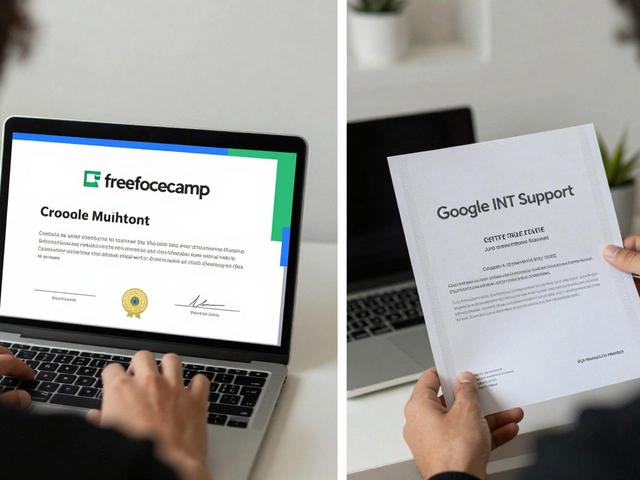Are you thinking about jumping into the world of coding but unsure where to start? Choosing the right place can feel overwhelming with so many options out there. But don't worry; you're not alone in this. Whether you're curious about developing apps, creating web pages, or diving into data science, there’s a perfect spot for you to kick off your learning journey.
First things first, you'll want to figure out how you like to learn. Do you prefer detailed online courses that you can tackle in your pajamas, or maybe you're the kind of learner who thrives in a bustling classroom environment? Knowing this can save you a lot of time and energy. With online platforms like Coursera and Codecademy, you have the flexibility to learn whenever you want, tackling topics as you go. They're super comprehensive and often come with communities of learners you can connect with.
- Understanding Your Learning Style
- Online Platforms: Convenient and Comprehensive
- In-Person Bootcamps: Intense but Rewarding
- Community Colleges: Affordable and Local
- Self-Teaching: Going at Your Own Pace
- Making the Right Choice for You
Understanding Your Learning Style
Before diving into the world of coding, it's crucial to understand how you learn best. Everyone processes information differently—some thrive in interactive environments, while others prefer a solo journey. Grasping your learning style can make or break your progress when tackling coding classes.
Consider if you're a visual learner who benefits from videos and demonstrations. In this case, platforms like YouTube or online courses with plenty of visual content, like Codecademy, might suit you perfectly. On the other hand, if you're more of an auditory learner, podcasts or courses that offer lectures might be your thing. Websites like Coursera offer such materials, catering to diverse needs.
Let's look at some common learning styles and the kind of resources that align with them:
- Visual Learners: Go for video-based tutorials, infographics, and diagrams. Lynda and Khan Academy offer detailed video tutorials.
- Auditory Learners: You might excel with webinars and podcasts. Websites like Udacity often provide narrated lectures.
- Reading/Writing Learners: Text-based tutorials and books are your best friends. FreeCodeCamp offers extensive written guides.
- Kinesthetic Learners: Interactive sessions and hands-on projects, such as those available through coding bootcamps, can work wonders for you.
Identifying your style early can save time and help you immerse yourself in programming courses without unnecessary stress.
If you’re curious about effectiveness, studies indicate that structured online platforms improve learning outcomes by up to 25% because they cater to different learning preferences (Source: 2022 Global Online Education Report). This is a good reason to explore various methodologies and find out what clicks for you.
Online Platforms: Convenient and Comprehensive
When it comes to diving into the world of coding, online platforms are like a treasure trove for beginners. You can learn at your own rhythm and at a pace that suits you, whether it's in the middle of the night or during your lunch break. Some platforms offer free courses, while others have more in-depth options if you're ready to invest in your education.
Let’s talk specifics. For instance, Codecademy is a big-name player in the coding education game. It offers interactive courses on several programming languages like Python, JavaScript, and even more specialized topics like web development. Plus, it’s super user-friendly. Think of it as a place to get your hands dirty with code without feeling out of your depth.
Then there's Coursera, where you can access courses from top-notch universities and companies. Ever fancy taking a course on Python from the University of Michigan? Coursera makes that happen. The best part? You can get certifications that actually hold some weight in the real world, perfect for when you're beefing up your resume.
Don’t forget about Udacity. It's a bit different because it specializes in nanodegrees. These are programs created with industry leaders, focusing on skills that are immediately relevant out there in the wild tech world. If you've got a specific career in mind, this might be your golden ticket.
| Platform | Main Focus | Certification |
|---|---|---|
| Codecademy | Interactive coding exercises | Basic to advanced certificates |
| Coursera | University-level courses | Verified certificates, professional certificates |
| Udacity | Niche technology skills | Nanodegrees |
Picking the right platform comes down to what suits your goals. If you're just starting and want a taste of coding without a commitment, check out free courses on Codecademy. But if you're looking to go deeper, maybe even turn this into a career, Coursera or Udacity could be your jam. No matter what you choose, these platforms are great stepping stones towards learning to code.
In-Person Bootcamps: Intense but Rewarding
So, you're thinking about jumping headfirst into coding and want to make quick progress? In-person bootcamps might be the perfect fit for you. These programs are well-known for their intense, fast-paced schedules that cram months of learning into just a few weeks. It's like a coding bootcamp on steroids!
Bootcamps are typically designed for those who are ready to dive deep and commit full-time. They offer a structured environment, which helps maintain focus, and often include hands-on projects, real-world problem solving, and plenty of face-to-face interaction with instructors and peers. This immersive experience is what makes them both challenging and rewarding.
Popular bootcamps like General Assembly, Ironhack, and Le Wagon have become household names in the coding world. They promise not just learning but also career support. Many of these programs boast job placement rates of over 80% within six months of graduating, which is truly impressive. In fact, here's a quick look at some data from these well-known bootcamps:
| Bootcamp | Duration | Job Placement Rate |
|---|---|---|
| General Assembly | 12 weeks | 90% |
| Ironhack | 9 weeks | 85% |
| Le Wagon | 9 weeks | 93% |
The cost might seem steep, often ranging from $7,000 to $15,000, but the investment can pay off quickly, especially with the high demand for tech roles. Be sure to check if they offer any scholarships or income share agreements to ease the financial burden.
If you thrive in environments where you learn by doing and can dedicate yourself full-time, in-person coding bootcamps are a fantastic way to accelerate your learning and get into the workforce fast. Just be ready for a whirlwind experience that’s as rewarding as it is demanding!

Community Colleges: Affordable and Local
Thinking about learning to code on a budget without leaving your hometown? Community colleges might be just the ticket. They offer a mix of affordability and accessibility, perfect for those who prefer sticking to a more traditional classroom setting.
Many community colleges offer courses in programming languages like Python, Java, or web development frameworks. These classes are usually part of a larger curriculum, sometimes leading to an associate degree or a certificate, which could boost your resume. The beauty of these classes is that they're structured, so you’ll have a schedule and a syllabus guiding you through the learning process.
Plus, community colleges offer smaller class sizes compared to universities, meaning more personal contact with instructors. Imagine being able to ask your professor questions and getting real-time feedback—it's like having a coding coach by your side.
If you're worried about costs, community colleges are often cheaper than four-year universities and coding bootcamps. And don’t forget to check if the school offers financial aid or scholarships; many do. Access to these resources can significantly reduce out-of-pocket expenses.
Here’s a little pro tip: many community colleges provide online courses too. So, if you like the idea of community college but can’t commute, you might be able to take classes from home.
According to the American Association of Community Colleges, in 2024, about 8 million students were enrolled in community colleges, many of whom were pursuing technical and applied sciences, including coding classes. This highlights the growing trend of students seeing community colleges as a viable path to dive into the tech world.
Community colleges are local, affordable, and offer a solid grounding in coding. It’s a smart option for those who like a structured environment with the perks of face-to-face learning and potential cost savings.
Self-Teaching: Going at Your Own Pace
Not a fan of schedules and structured environments? Self-teaching might be your jam. It’s all about learning to code on your terms and at your speed. You get to decide what to learn and when without the pressure of deadlines. For many, this freedom is a game-changer.
Starting is easier than you might think. Tons of resources are available online, many of which are free. Websites like Codecademy and freeCodeCamp offer step-by-step coding instructions that cater to beginners. Platforms like GitHub also provide a treasure trove of open-source projects. It's a fantastic way to see how coding works in real life.
An excellent method for self-learning is focusing on project-based learning. Instead of randomly going through lessons, pick a project that excites you. Maybe you want to create a personal website or a simple app. These projects not only boost your skills but also give you something to show for your hard work.
However, self-teaching can sometimes be a lonely road. Engage with coding communities on Reddit or Stack Overflow where you can ask questions, find mentors, and build a network. Regularly engaging with others can add structure to your learning.
A cool thing about self-teaching is it doesn’t break the bank. But staying disciplined is key. Plan a study schedule. Allocate specific hours each week for coding and stick to it as if you have a class to attend. Consistency will keep the momentum going, and before you know it, you'll start seeing progress.
Remember, the self-teaching path might take a bit longer but the skills you gain are powerful. You’ll learn how to program, yes, but also how to learn and adapt, which is just as crucial in the tech world.
Making the Right Choice for You
Picking where to learn coding can be tricky, but it's super important to choose something that matches not just your goals, but also your lifestyle. Let's explore the factors that can help you figure out your perfect fit.
First, think about your learning style. If you're someone who thrives on structure and needs a set schedule, then in-person bootcamps or community college courses might be your jam. These environments offer direct interaction with instructors and fellow students, which can be really motivating.
On the flip side, if you crave flexibility and prefer going at your own pace, online platforms like Coursera and Codecademy offer loads of courses that let you choose when and where you study. They're perfect for busy folks who might only have time to code during odd hours.
Another thing to consider is cost. A full-time bootcamp can cost anywhere from $8,000 to $20,000, which is quite an investment. If you're not ready for that financial commitment, starting with free or cheaper online options might make more sense. Platforms like Codecademy even offer free versions of their courses.
Also, don't overlook self-teaching if you're really disciplined. With tons of free resources out there, you can build a solid foundation with just a laptop and internet connection. This method's great if you're balancing other responsibilities and need a zero-cost entry point.
Still undecided? Try a mix. Start with a trial week of a bootcamp or an introductory coding class on Coursera, and see how it feels. You can always adjust your path as you grow more comfortable or when your circumstances change. Remember, learning to code isn't one-size-fits-all. It's about what works best for you.










0 Comments